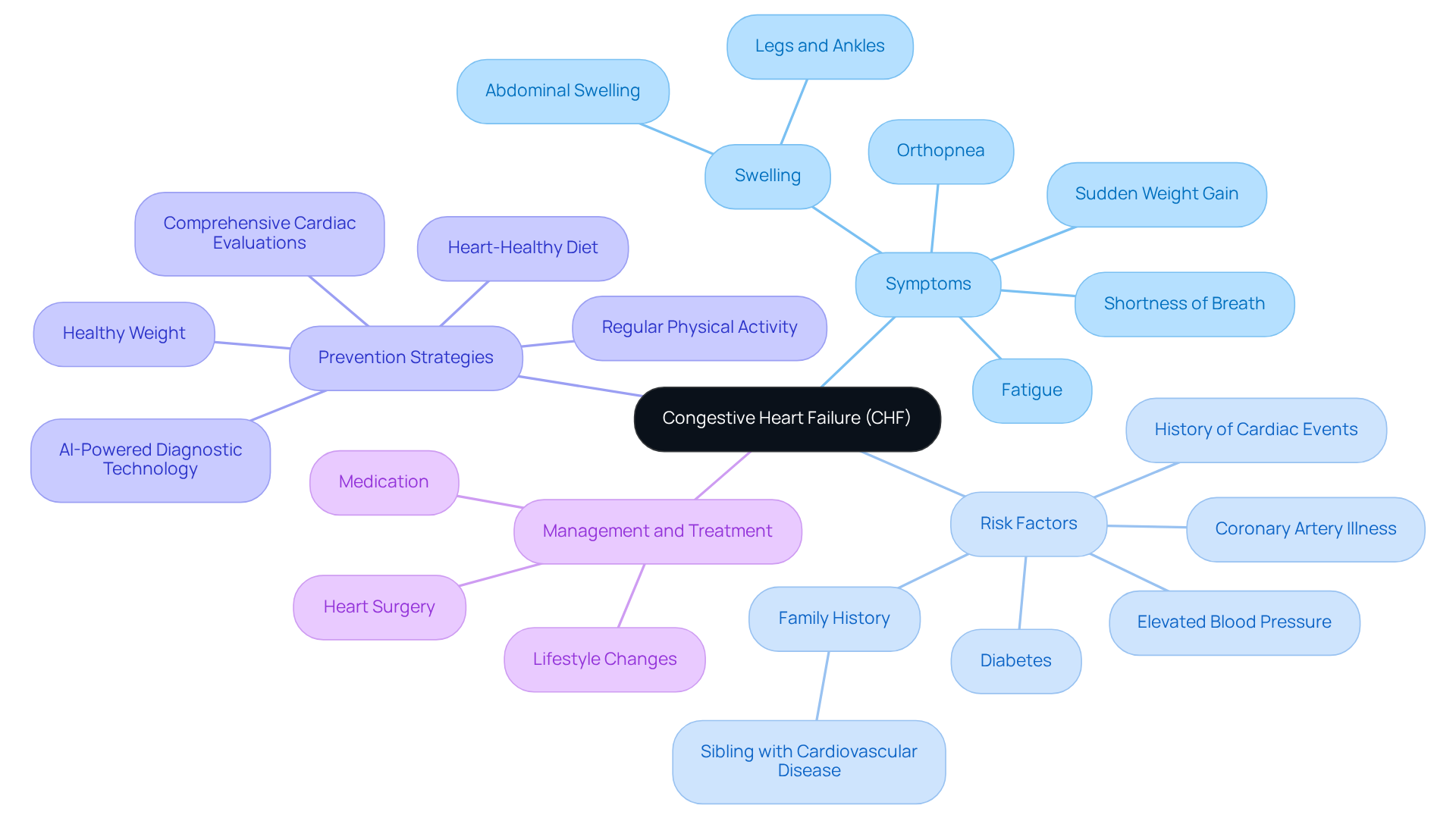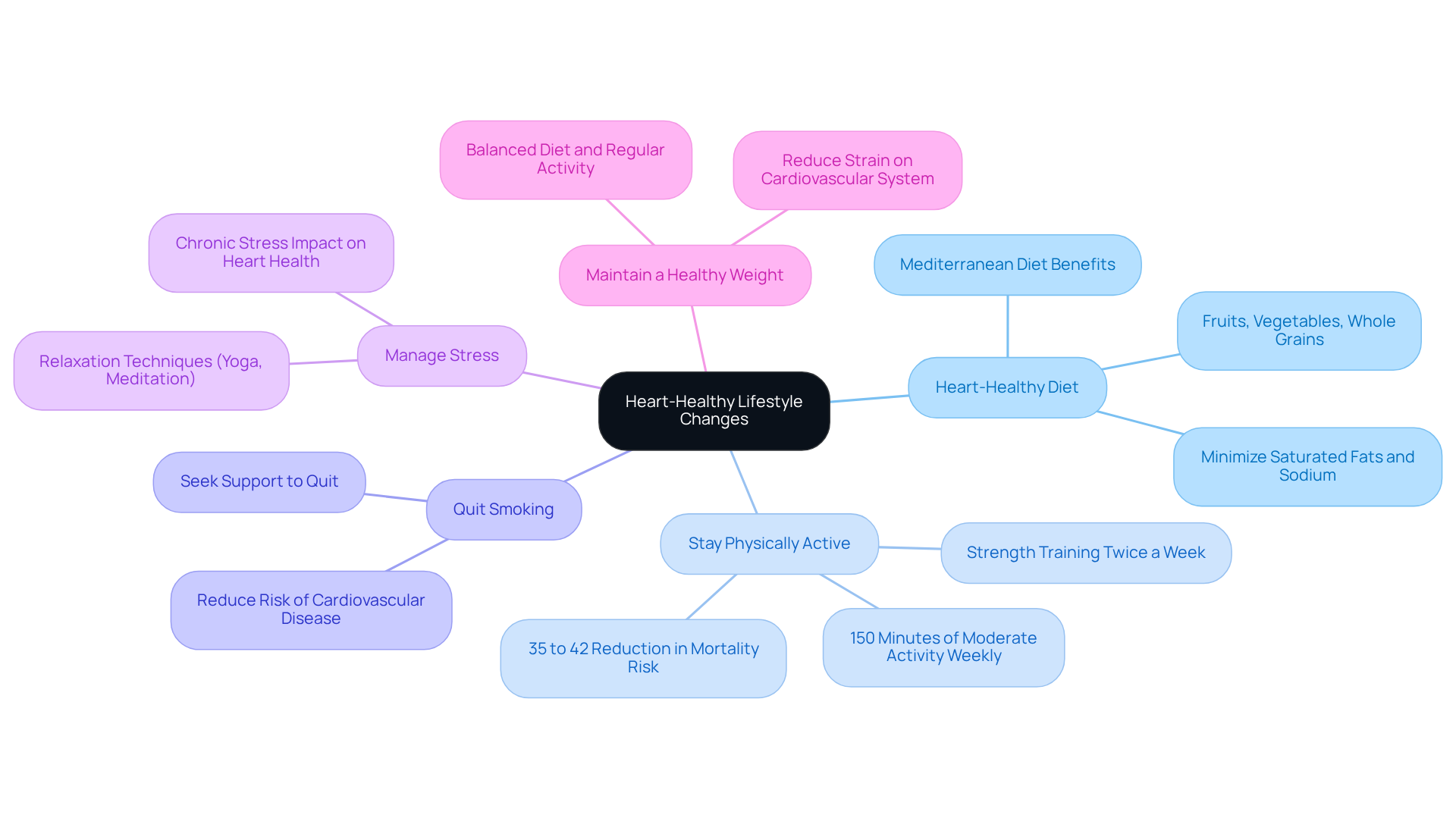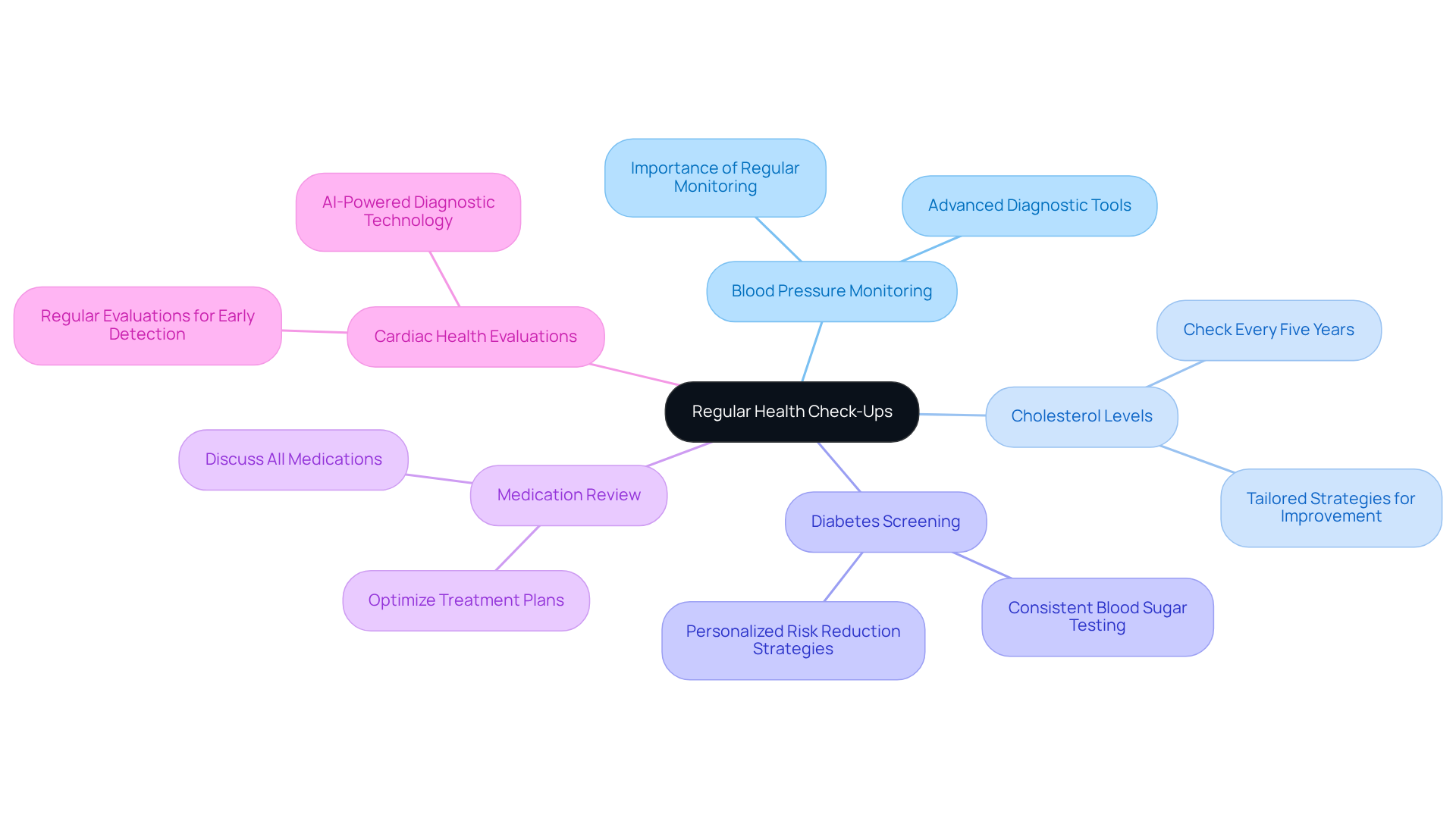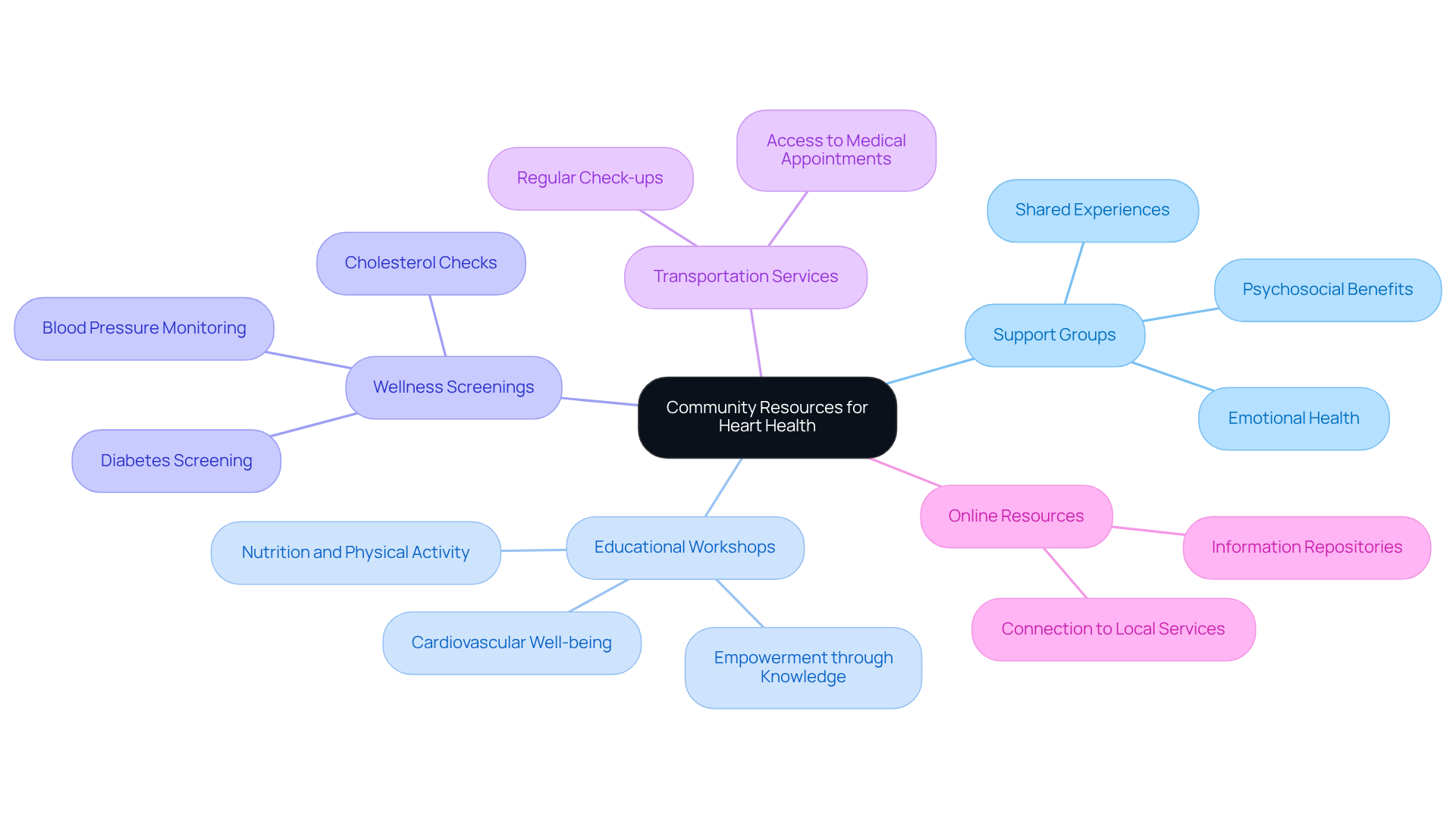


To prevent congestive heart failure (CHF) in seniors, it is essential to embrace a heart-healthy lifestyle. Have you considered how small changes can make a big difference? Regular health check-ups and utilizing community resources for support are vital steps towards better health.
Making specific lifestyle changes can greatly enhance your well-being. The following are key components to consider:
Furthermore, regular medical evaluations and community programs play an important role in promoting cardiovascular health and ensuring early intervention. Remember, you are not alone on this journey; there are resources and people ready to support you.
Taking these steps can feel overwhelming at times, but rest assured that each small change contributes to a healthier heart. Reach out to your healthcare provider or community resources today to discuss how you can start making these positive changes. Your heart deserves the best care, and together, we can work towards a healthier future.
Understanding the intricacies of congestive heart failure (CHF) is vital for seniors, as this condition presents significant risks to their health and well-being. With CHF being a leading cause of hospitalization among older adults, recognizing the symptoms and risk factors can empower individuals to take proactive steps in managing their cardiovascular health. But how can seniors effectively prevent this potentially debilitating condition while navigating the complexities of lifestyle changes, regular health check-ups, and community support?
In addition to this, there are actionable strategies that can enhance heart health and improve overall quality of life for seniors facing the challenges of congestive heart failure. By embracing these strategies, seniors can feel more in control of their health journey. Remember, you are not alone in this; support is available, and taking small steps can lead to meaningful improvements.
Congestive heart failure (CHF) is a serious condition where the heart struggles to pump blood effectively, leading to fluid accumulation in the lungs and other areas of the body. This can result in common symptoms such as shortness of breath, fatigue, and swelling in the legs and ankles. For seniors, recognizing these symptoms is crucial, as CHF can significantly impact their quality of life. In fact, CHF is a leading cause of hospitalization among older adults, highlighting the importance of awareness and early intervention.
Multiple factors contribute to the development of CHF, especially in older adults. These include:
Furthermore, having a sibling with cardiovascular illness can elevate the chance of cardiac problems by as much as 45%.
Understanding these risk factors and symptoms is essential for elderly individuals to learn how to by identifying possible warning signs promptly. For instance, sudden weight gain of more than 2-3 pounds in a week, increased swelling in the feet or ankles, and difficulty breathing when lying down (orthopnea) are indicators that warrant immediate medical attention.
At Amavita Heart and Vascular Health®, we emphasize comprehensive cardiac evaluations and preventive strategies on how to prevent congestive heart failure to decrease the likelihood of a heart attack. Our preventive cardiology strategy integrates sophisticated assessment tools and customized interventions, ensuring that elderly individuals receive personalized care that caters to their specific conditions and lifestyles. Moreover, our innovative AI-powered diagnostic technology enhances early detection, allowing for real-time guidance and accurate imaging, which is crucial for informed decision-making in cardiac care.
Recent research highlights how to prevent congestive heart failure by emphasizing the importance of lifestyle changes, such as:
By being proactive and knowledgeable, older adults can take significant steps toward managing their cardiovascular health and enhancing their overall well-being. As the saying goes, "Heart disease is not a death sentence; it’s a wake-up call." By recognizing the signs and seeking timely medical advice, older adults can improve their quality of life.

To effectively prevent congestive heart failure, it’s important for seniors to consider a few lifestyle modifications that can truly make a difference in their health and well-being:
Remember, these changes may seem challenging at first, but taking small steps can lead to significant improvements in your health. You deserve support on this journey, and making these lifestyle adjustments can enhance your quality of life.

Elderly individuals are encouraged to schedule regular medical examinations with their healthcare professional to monitor cardiovascular health and understand how to prevent congestive heart failure by effectively managing risk factors. At Amavita Heart and Vascular Health®, we recognize the significance of these check-ups, which encompass:
We understand that health concerns can be daunting, but rest assured, you are not alone in this journey. Our team is here to support you every step of the way, ensuring you receive the care and attention you deserve.

Seniors can significantly enhance their heart health by leveraging various community resources that provide support and education on how to prevent congestive heart failure.
By utilizing these resources, seniors can learn how to prevent congestive heart failure while enhancing their heart health and overall well-being, making informed choices that lead to better health outcomes. It is also important to note that individuals living outside metropolitan areas are 30% less likely to participate in cardiac rehab programs. This underscores the need for accessible community workshops to improve participation rates. Remember, you are not alone in this journey, and there are many resources available to support you.

Recognizing the importance of preventing congestive heart failure (CHF) is crucial for seniors who wish to enhance their cardiovascular health. As CHF stands as a leading cause of hospitalization among older adults, understanding its symptoms, risk factors, and preventive measures becomes essential. By prioritizing awareness and intervention, seniors can take proactive steps to improve their quality of life and reduce the risks associated with this serious condition.
This article highlights several key strategies for preventing CHF:
Ultimately, the journey toward preventing congestive heart failure is not one that must be taken alone. By embracing these lifestyle changes, scheduling regular medical evaluations, and utilizing available community resources, seniors can empower themselves to take control of their heart health. The significance of proactive engagement in one's health cannot be overstated—now is the time to act and prioritize cardiovascular wellness for a healthier, more fulfilling life.
What is congestive heart failure (CHF)?
Congestive heart failure (CHF) is a serious condition where the heart struggles to pump blood effectively, leading to fluid accumulation in the lungs and other areas of the body.
What are common symptoms of CHF?
Common symptoms of CHF include shortness of breath, fatigue, and swelling in the legs and ankles.
Why is it important for seniors to recognize the symptoms of CHF?
It is crucial for seniors to recognize the symptoms of CHF because it can significantly impact their quality of life and is a leading cause of hospitalization among older adults.
What factors contribute to the development of CHF in older adults?
Factors that contribute to the development of CHF in older adults include elevated blood pressure, coronary artery illness, diabetes, and a history of cardiac events. Additionally, having a sibling with cardiovascular illness can increase the chance of cardiac problems by as much as 45%.
What are some warning signs of CHF that require immediate medical attention?
Warning signs of CHF that warrant immediate medical attention include sudden weight gain of more than 2-3 pounds in a week, increased swelling in the feet or ankles, and difficulty breathing when lying down (orthopnea).
How does Amavita Heart and Vascular Health® approach the prevention of CHF?
Amavita Heart and Vascular Health® emphasizes comprehensive cardiac evaluations and preventive strategies to decrease the likelihood of a heart attack, integrating sophisticated assessment tools and customized interventions for personalized care.
What role does AI technology play in CHF diagnosis and care?
Innovative AI-powered diagnostic technology enhances early detection of CHF, allowing for real-time guidance and accurate imaging, which is crucial for informed decision-making in cardiac care.
What lifestyle changes can help prevent congestive heart failure?
Lifestyle changes that can help prevent CHF include maintaining a healthy weight, following a heart-healthy diet, and engaging in regular physical activity.
How can older adults improve their cardiovascular health?
By being proactive and knowledgeable about their health, older adults can recognize the signs of CHF, seek timely medical advice, and take significant steps toward managing their cardiovascular health and enhancing their overall well-being.